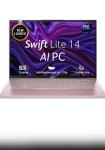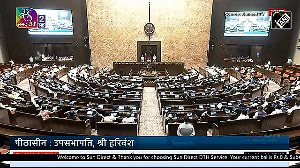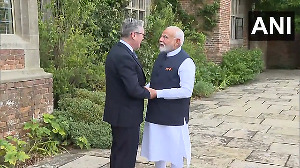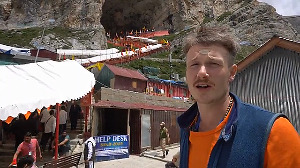India's silence on this week's troubles in the Maldives is puzzling, says Rajeev Sharma.
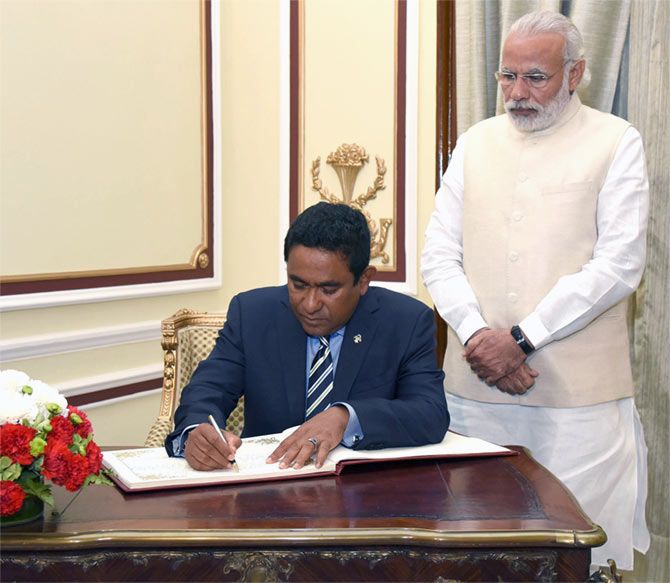
Embattled Maldivian President Yameen Abdul Gayoom, who narrowly survived a no-confidence motion against the parliament speaker on Monday, March 27, is practising the age-old dictum: Attack is the best defence.
President Yameen was pushed to the wall by a grand alliance of four major parties last Friday which included his half-brother, former president Maumoon Abdul Gayoom.
After all, Maldivian politicians follow Indian politics closely and are well aware of how the coming together of all major parties had humbled the Bharatiya Janata Party in the Bihar assembly polls in November 2015 and how the failure of anti-BJP parties to sew up a Bihar-type grand alliance in the assembly elections in Uttar Pradesh led to the BJP's unprecedented victory.
Yameen is determined to ensure that his arch enemy former president and leader of the Maldives Democratic Party Mohammed Nasheed and his new rivals don't take a leaf out of the book of the Indian Opposition and do a Bihar unto him.
Maldives is due to hold local civic polls soon which have already been deferred thrice.
These elections assume importance as they come ahead of next year's presidential election.
Coming events cast their shadow before.
This was demonstrated last Monday when the Ppposition, bolstered by the four parties' grand alliance of last week, proved to the world that President Yameen's majority in parliament collapsed during the March 27 no-confidence motion.
Yameen, who routinely enjoyed support from some 60 MPs in the 85-member House till recently, saw this number coming down to 48, virtually hanging to the throne by the skin of its teeth.
President Yameen has launched a crackdown on the entire Opposition, including his half-brother Gayoom.
Maumoon Abdul Gayoom's case is quite interesting.
On March 30, a civil court issued an enforcement order instructing the police to stop former president Maumoon Abdul Gayoom, leader of the ruling Progressive Party of Maldives, from using the PPM logo, flag or name.
The court also ordered the police to disband Maumoon's office, thereby obstructing political activity led by Maumoon's faction of the PPM.
Maumoon's intimidation didn't stop here.
Hours after the parliamentary vote on Monday, the Yameen faction of the PPM expelled Maumoon from the party.
This despite the fact that the PPM committee that expelled Maumoon has no legal standing because it was suspended last year.
The PPM was founded and led by Maumoon since 2011.
President Yameen reserved even nastier treatment for Nasheed and slapped new charges of terrorism against him, which relate to Yameen's brief isolation by the Maldives national defence force in 2010.
A third Opposition leader, Qasim Ibrahim, an MP and leader of the Jumhooree Party, was summoned to the police headquarters on March 29 evening and questioned for over four hours on charges of 'attempting to offer bribes', 'influencing the official conduct of a public official' and 'intimidating, improperly influencing a voter.'
He was also questioned over a speech he gave in which he invited parliamenterians to join the Opposition movement and vote to remove the parliament speaker.
Qasim has also been banned from travelling outside the Maldives.
The bank accounts of his business, Villa Shipping Company Private Ltd, were frozen days before the parliamentary vote.
Yet another Ppposition leader, parliamentarian Abdulla Riyaz, deputy leader of the Jumhooree Party, was also summoned by the police on March 27 and questioned on charges of 'spreading false rumours' and attempting to influence the police.
Then there is the case of Faris Maumoon, an MP who has been coordinating the Opposition's efforts from within the ruling party, who was summoned five times by the police prior to Monday's vote.
Faris was also questioned over an audit report from 2008 in connection with a case that has hitherto not been linked to him.
Former defence minister Colonel Mohamed Nazim, a leading critic of President Yameen, was taken from house arrest back to jail on March 30.
This is despite the fact that the United Nations Working Group on Arbitrary Detention recently ruled Nazim's incarceration illegal under international law and called for his immediate release.
MDP spokesperson Hamid Ghaffoor said his party's secretary general, Anas Abdul Sattar, was also summoned to the police on March 30 evening and wasn't even informed of the charges against him.
Now have a look at how prominent Opposition leaders have reacted to Yameen's increasing authoritarianism.
Minority Leader Ibrahim Mohamed Solih, MP: 'Time and again, whenever the president feels threatened, he unleashes a campaign of intimidation against Opposition leaders and critics. Now, Yameen's tactics are becoming more flagrant and only signals the extreme levels of insecurity affecting President Yameen and his regime.'
Qasim Ibrahim MP, Jumhooree Party leader: 'The targeting of the Opposition's leadership appears to be a knee-jerk reaction to the Opposition gaining ground. We will not cower, we will not be intimidated.'
Faris Maumoon, MP, Progressive Party of Maldives: 'Maldivians must see this renewed crackdown for what it is: A test for democracy. We must remain steadfast in supporting each other. We will remain steadfast until we set the country on the path to democracy.'
Anara Naeem, MP, Adhaalath Party: 'Adaalath Party will work for the betterment of the Maldivian people. We will work with our partners, to achieve the reforms Maldivian people want.'
In the middle of this deteriorating political crisis in the Maldives, the most astonishing thing is India's complete silence.
Why is India keeping silent?
Why isn't there even a single line statement from the ministry of external affairs on a highly strategic neighbour like the Maldives?
Rajeev Sharma, an independent journalist and strategic analyst, tweets @Kishkindha
IMAGE: Maldives President Abdulla Yameen Abdul Gayoom with Prime Minister Narendra Modi in New Delhi, April 11, 2016; Photograph: Press Information Bureau








